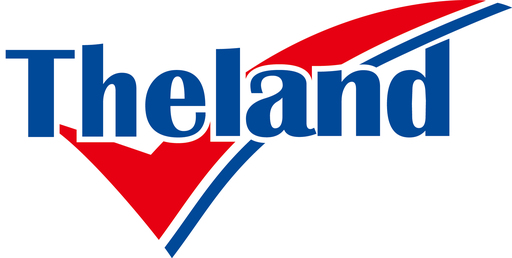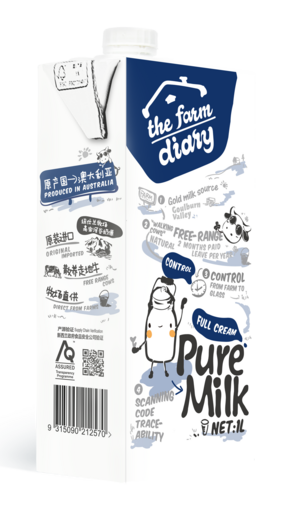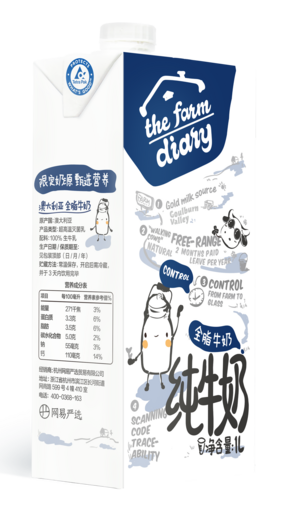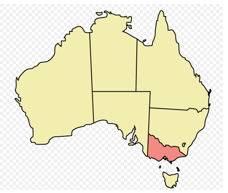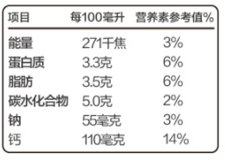
AQ Assured by AsureQuality, New Zealand's Government-owned food assurance company.
The Farm Diary Full Cream Pure Milk (1L)
PRODUCT ATTRIBUTES VERIFIED BY AQ ASSURED
- 100% Australian Made
- Made from 100% raw milk
- 100% Fresh UHT Milk
- No added colours
- No artificial flavours
- No preservatives
- No added sugar
- Family Pack
 Origin
Origin
This product is 100% Australian made.
The raw milk is sourced from cows located on dairy farms within and around the Goulburn district in the State of Victoria, South Australia.
The cows roam freely outside on paddocks throughout the year where they graze on fresh pasture.
To ensure that their nutritional needs are met, the cows are provided with supplementary feed during winter and poor weather conditions.
Dairy farming practices in Victoria varies depending on location and season, as climate factors influence grass growth and nutrition.
To ensure efficient use of farmland and supply of pasture, fields are rotated regularly with cow herds being allocated to a specific paddock during each rotation.
Theland Supply Chain
There are systems in place throughout the supply chain to ensure that each carton of milk meets high standards of quality and safety.
Select into any part of the supply chain to view the verified activities and assurances at each step.
The Farm
Farm Assurances- Animal Welfare
All animals are clearly identified through the National Livestock Identification System (NLIS) - Australia's system for identifying and tracking dairy cattle.
Farms must meet their obligations under the Australian Animal Welfare Standards and Guidelines for Cattle (2014) and other legislation to ensure that all aspects of animal health and welfare are considered. This includes performing health checks on the animals and having systems in place to isolate any unhealthy animals from the herd.
Protection from extreme heat or cold temperatures must be available to the cows, which can include access to trees and hedges that provide shelter.
Farm Assurances- Milk Supply
All milk supplier farms are required under the Dairy Act 2000 to be licensed with Dairy Food Safety Victoria (DFSV) and to comply with the conditions of the licence. This includes compliance with the relevant provisions of the Australia New Zealand Food Standards Code.
The farms are regularly audited by approved auditors to demonstrate compliance to the regulatory standards.
The milk must be filtered and chilled to below 5°C within 3.5 hours from the start of milking to ensure freshness and prevention of microbial growth.
The milk must be kept chilled while stored on the farm awaiting collection.
Farm Assurances- Water Use
In Victoria water for commercial use is regulated on behalf of the Ministry of Water to ensure sustainable use of the resource.
Legislation requires operating dairy farms to hold a license to use water and all water used on the farm is metered to ensure compliance.
Water used in the milking shed must be suitable for use and the farm should hold records of any testing.
Dairy Carriers-Assurances
Dairy carriers in the state of Victoria, Australia are required under the Dairy Act 2000 to be licensed with DFSV and to comply with the conditions of the license.
Dairy Carriers must also comply with all relevant provisions of the Food Act 1984 and the Australia New Zealand Food Standards Code (FSANZ).
The dairy carrier controls any potential food safety hazards by implementing a documented food safety program through all stages from collection, transportation, and delivery.
Prior to collecting the milk at the farm, the tanker driver takes a sample of the milk to be tested by the factory.
The milk is transported to the factory in tankers which maintain the temperature of the chilled milk.
Records are kept ensuring traceability of milk. This includes the tanker details, date and time of milk collection, temperature of milk, description and quantity of milk collected and delivery destination.
Once the delivery is made the tanker is cleaned in place (CIP) with approved chemicals and potable water.
The Factory
Factory Assurances
On arrival at the factory a sample of the chilled milk is taken from the tanker and checked for quality.
The milk is not accepted if it fails to meet required specifications.
Once approved for use, the milk is heat treated to ensure commercial sterility is achieved.
The milk is aseptically packed into individual tamper-proof Tetra Pak cartons.
All cartons are individually coded with the date, time, line number and jaw number for traceability.
The products are stacked onto pallets, stretch wrapped and barcoded for traceability.
Chemical, microbial, and sensory tests are conducted on the finished product to ensure that safety and quality requirements are met.
Regulatory Assurances
The Export Control (Milk and Milk Products) Rules 2021 require that water used within the factory must be potable.
Water potability standards are prepared by the National Health and Medical Research Council and activities must be undertaken to verify the quality of water against the Australia Drinking Water Guidelines.
In addition to company- based testing, samples of finished product are collected by DFSV auditors during routine audits and are assessed through the DFSV product surveillance program.
The dairy factory is regularly audited to ensure it complies with the regulations which include:
- The Dairy Act 2000
- The Food Act 1984
- The Australia New Zealand Food Standards Code (FSANZ)
- Dairy Food Safety Victoria (DFSV).
The factory must be registered with the Department of Agriculture and Water Resources and meet the requirements of The Export Control (Milk and Milk Products) Rules 2021.
A declaration of compliance statement must accompany each shipment attesting that the product is:
- Eligible for export
- Fit-for-human consumption
- Meets any specific importing country requirements
Transport
Transport Assurances
Prior to loading of the product, the cleanliness of the interior of both the transport vehicle (truck) and the shipping container are checked.
The freight forwarding company receive the containers at the wharf and prepare the shipment.
Shipping
Shipping Assurances
The shipping company must ensure that the products are accompanied by all EAD (export accompanied documents) that are required by the importing country, including:
- customs documents
- health certificates
- certificates of laboratory testing analysis
All other documents that are required by the importing country must be completed and approved before the container is sealed and loaded on board the ship.
The product is shipped to China and checked by China Customs on arrival. China Customs check the import documentation to confirm all requirements have been met and may test the product again prior to releasing it into the country.
Once cleared by Customs the product is sent to the warehouse.
Retail
Retail Assurances
The product arrives at the warehouse where it is managed using barcoding and traceability systems.
Product is loaded onto delivery trucks and distributed to individual shops, supermarkets, and other customers.
Retailers ensure that the product is fresh by using good stock rotation and checking best before dates before selling the product to consumers.
The AQ Assured™ brand and QR code can be scanned to provide consumer confidence of the safety and quality measures undertaken throughout the supply chain.
 Environmental
Environmental
The Farm
To ensure the sustainable use of water within the State of Victoria, water for commercial use is regulated on behalf of the Victorian Government Department of Agriculture and Water Resources (Ministry of Water).
Dairy Farms using water in dairy sheds are required to hold a license to take and use the water.
To improve on farm productivity whilst minimizing environmental impact, farmers must comply with the Environmental Protection Authority Victoria (EPA) requirements for the management of waste.
These requirements are in place to ensure that effluent is contained within farm boundaries and does not enter water supplies or contaminate land.
 Social & Ethical
Social & Ethical
Animal Welfare
Through each calendar year the cows are typically milked every day for around 300 days per year.
This gives the cows a stand down period of around two months per year when they are not milked as they prepare for the season ahead.
Farmers have obligations under legislation to ensure that milk is only collected from healthy animals.
The legislation includes:
- The Australian Animal Welfare Standards and Guidelines for cattle (2014)
- The Victorian Livestock Management Act 2010.
 Safety & Quality
Safety & Quality
The safety and quality of the milk is ensured through systematic identification and management of hazards throughout the supply chain:
- Stock are clearly identified to ensure traceability.
- Farms must be registered with Dairy Food Safety Australia and comply with conditions within the license This includes the requirement for to have an audited food safety program.
- Milk is only collected from healthy animals.
- The milk is chilled on farm to below 5 °C within 3.5hours from the start of milking.
- To maintain freshness the milk is kept chilled on the farm until it is collected.
- Samples of the milk are taken on farm for testing at the laboratory.
- On arrival at the factory a sample of the milk is removed from the tanker and assessed for quality evaluation.
- The milk is processed to strict specifications.
- The milk is tested throughout production to ensure its meets specifications and regulatory compliance.
- The factory holds accreditations to ensure compliance to all relevant legislation including the Food Act, The Dairy Act and DFSV.
- The factory must process the milk in accordance with the requirements in The Export Control (Milk and Milk Products) Rules 2021 and those of the importing country.
- The final product is tested to ensure compliance.
- The product meets the overseas market access requirements (OMAR) of the countries to which it exports.
 Nutrition
Nutrition
100% Australian cow’s milk.
Contains no added colours, flavours, sweetners or preservatives.
This product contains 100% natural protein. Protein is important for the growth and repair of the body's cells and for building muscle.
This product contains 100% natural milk calcium. Calcium is an important source of nutrition for building strong, dense bones in early life, and in keeping bones strong and healthy in later life.
